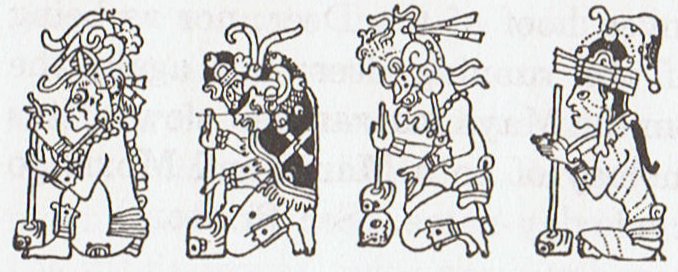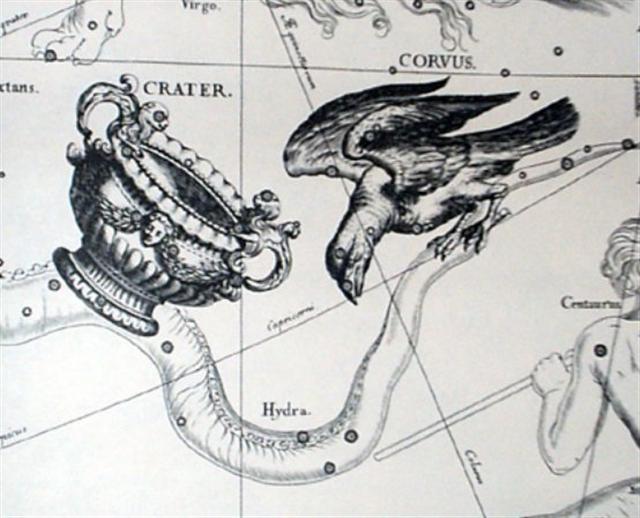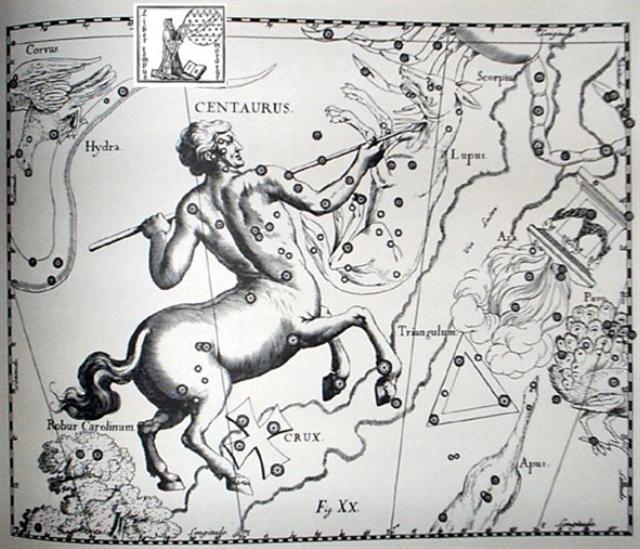For the basic myth was that of stealing the celestial fire in order to bring light to us humans living down on earth - an event which was reiterated every morning as night turned into day. In Manuscript E the yam roots were stolen: ... Teke, Oti, and their assistants [toraua titiro] went on. Teke secretly told [he nave] his assistants, 'Later during the night you are to go (there) and dig up the yams of my (classificatory) brother (tangata taina) Maeha. When you have dug out all the big and small roots, so that nothing is left in the soil (? ka paepae tahiro), then you shall break them up completely and rub the pieces in your hands. This way, when Maeha names them, I can find out the names of the various kinds of yams.' [te ingoa.o te uhi] Then Teke said to his assistants, 'Work quickly until late at night (? or 'until it gets light', ite ao ana), when you shall take the baskets and fill them up with yams.' To this they replied, 'Agreed.' [E:58-59] Ogotemmêli gave us a curious comment - in order to draw attention and to make us memorize - when he noted that in his language the word for stolen was Gouyo! ... All was now ready for departure except that there was no fire in the smithy. The ancestor slipped into the workshop of the great Nummo, who are Heaven's smiths, and stole a piece of the sun in the form of live embers and white-hot iron. He seized it by means of a 'robber's stick' the crook of which ended in a slit, open like a mouth. He dropped some of the embers, came back to pick them up, and fled towards the granary; but his agitation was such that he could no longer find the entrances. He made the round of it several times before he found the steps and climbed onto the flat roof, where he hid the stolen goods in one of the skins of the bellows, exclaiming: 'Gouyo!', which is to say. 'Stolen!'. The word is still part of the language, and means 'granary'. It is a reminder that without the fire of the smithy and the iron of hoes there would be no crops to store ...
In the G text we can read about the release of flames (luminous rays) in the month of Te-hetu'u-pú, when at the time of Bharani the Sun had reached day *336 (= 4 * 84) as counted from 0h: Hetu 1. To (make) sound; figuratively: famous, renowned. 2. To crumble into embers (of a bonfire). Hetu'u. Star, planet; hetu'u popohaga morning star; hetu'u ahiahi evening star; hetu'u viri meteorite. Vanaga. Hetu 1. Star (heetuu); hetu rere, meteor; hetu pupura, planet. P Pau.: hetu, star. Mgv.: etu, id. Mq.: fetu, hetu, id. Ta.: fetu, fetia, id. The alternative form fetia in Tahiti, now the only one in common use, need not be regarded as an anomaly in mutation. It seems to derive from Paumotu fetika, a planet. Its introduction into Tahiti is due to the fashion of accepting Paumotu vocables which arose when the house of Pomare came into power. 2. Capital letter (? he tu). 3. To amuse. 4. To stamp the feet. Hetuhetu, to calk, to strike the water. Hetuke, sea urchin. Churchill. ... Maeha heard something, namely the noise that the men made, and he said [he-ki mai mai te rua painga] from the other side (of the house) to Teke, 'Hey you! This is the first time that such a noise has been heard at night.' [he ki mai a Teke] Teke answered from his side (of the house) [mai toona painga], 'My feet have made the noise that you heard.' [he vae ooku tau hetu ena.a koe hakarongo ena] And he very carefully [koro iti] made a noise [hakahetu] with his feet [i toona vae] ... [E:59] Pú. 1. To come forward to greet someone met on the road; to walk in front, to go in front: ka-pú a mu'a, let them go first. 2. Pú a mu'a, to intervene, to come to someone's rescue; he-pú-mai a mu'a, he-moaha, he came to my rescue and saved my life. 3. Ancient expression: ai ka-pú, ai ka-pú, tell us frankly what you think. 4. Hole, opening, orifice; well; circumference, rotundity; swirling water; pú-haga, vaginal orifice; pú-henua (also just henua), placenta. He pú henua nó te me'e aau, he-oti-á; ina-á me'e ma'u o te rima i-topa-ai koe, a placenta was all you had, it is a past thing now; you held nothing in your hands when you were born (stern words said to children to make them realize that they must not be demanding, since they were born naked and without possessions). 5. To dig out (tubers): he-pú i te uhi, to dig out yams. Vanaga.
At the time of rongorongo this star place in the sky dome had moved 41 days ahead in the Sun calendar, from day 414 (→ *41.4 = the right ascension day for the star Bharani) to day 414 + 41 = 455 (March 31) = 365 + 90.
364 / 4 = 91 days (= 13 weeks) after the December solstice (day 355) was the first day after 0h, i.e. 355 + 91 = 446 = *366. This corresponded to (the day for) the first variety of yam (te uhi), viz. to 1 he tara kura: Tara. 1. Thorn: tara miro. 2. Spur: tara moa. 3. Corner; te tara o te hare, corner of house; tara o te ahu, corner of ahu. Vanaga. (1. Dollar; moni tara, id.) 2. Thorn, spike, horn; taratara, prickly, rough, full of rocks. P Pau.: taratara, a ray, a beam; tare, a spine, a thorn. Mgv.: tara, spine, thorn, horn, crest, fishbone. Mq.: taá, spine, needle, thorn, sharp point, dart, harpoon; taa, the corner of a house, angle. Ta.: tara, spine, horn, spur, the corner of a house, angle. Sa.: tala, the round end of a house. Ma.: tara, the side wall of a house. 3. To announce, to proclaim, to promulgate, to call, to slander; tatara, to make a genealogy. P Pau.: fakatara, to enjoin. Mq.: taá, to cry, to call. 4. Mgv.: tara, a species of banana. Mq.: taa, a plant, a bird. Ma.: tara, a bird. 5. Ta.: tara, enchantment. Ma.: tara, an incantation. 6. Ta.: tara, to untie. Sa.: tala, id. Ha.: kala, id. Churchill Kura. 1. Also: poukura, the short, thin, multicoloured feathers of chickens and other birds. 2. The best of something, choice. Vanaga. Tutui kura, shawl. Kurakura, fair, light. Hakakurakura, to make to blush. P Pau.: kurakura, red, violet. Mgv.: kurakura, red, yellow, scarlet. Mq.: uáuá, red, ruddy. Ta.: uraura, red. Churchill. ... Dioscorea alata, called water yam, winged yam, and purple yam, was first cultivated somewhere in Southeast Asia. Although it is not grown in the same quantities as the African yams it has the largest distribution world-wide of any cultivated yam, being grown in Asia, the Pacific islands, Africa, and the West Indies ... In the Philippines it is known as ube (or ubi) and is used as an ingredient in many sweet desserts ... In Hawaii it is known as uhi. Uhi was brought to Hawaii by the early Polynesian settlers and became a major crop in the 1800s when the tubers were sold to visiting ships as an easily stored food supply for their voyages ...
When the Tail of the (Sun) Horse was at the Full Moon (Hotu), then it was certain that the Sun was at the Navel of the Horse (Sirrah). At the time of Bharani this had occurred in day 39 ("February 8) = 222 ("August 10) - 183 (= 366 / 2). In Roman times the day number for when the Full Moon was at the Tail of the Horse had been 14 days later, viz. at day 222 ("August 10) + 14 (= *41 - *27) = 236 and this number had surely been chosen as a kind of origo (zero) because 8 * 29½ (the lunar synodic month) = 236 nights. ... Notably the Raven, which was ascending in day 236 (= 8 * 29½) in Roman times ('August 24), had moved ahead due to the precession of the equinoxes with 27 days to 'a clean cup' in day 263 at the time of rongorongo ...
... I wan't a clean cup, interrupted the Hatter: let's all move one place on. He moved as he spoke, and the Dormouse followed him: the March Hare moved into the Dormouse's place [→ June, the month of Father Light, Jus-Piter], and Alice [→ Te Takapau] rather unwillingly took the place of the March Hare. The Hatter was the only one who got any advantage from the change; and Alice was a good deal worse off than before, as the March Hare had just upset the milk-jug into his plate ...
... At the time of rongorongo the Tail of the Horse had advanced with a further 27 days from 236 ('August 24) to 263 (September 20). 236 (Moon) + 263 (Venus) = 499.
When the Full Moon was at Centaurus it indicated the Sun was at the station of the Wolf. The Tail of the Horse (*183.1) - The Navel of the Horse (*0.5) = 182.6 = 365.25 / 2. The Wolf was the Opener of the Way: ... The king, wearing now a short, stiff archaic mantle, walks in a grave and stately manner to the sanctuary of the wolf-god Upwaut, the 'Opener of the Way', where he anoints the sacred standard and, preceded by this, marches to the palace chapel, into which he disappears. A period of time elapses during which the pharaoh is no longer manifest. When he reappears he is clothed as in the Narmer palette, wearing the kilt with Hathor belt and bull's tail attatched. In his right hand he holds the flail scepter and in his left, instead of the usual crook of the Good Shepherd, an object resembling a small scroll, called the Will, the House Document, or Secret of the Two Partners, which he exhibits in triumph, proclaiming to all in attendance that it was given him by his dead father Osiris, in the presence of the earth-god Geb. 'I have run', he cries, 'holding the Secret of the Two Partners, the Will that my father has given me before Geb. I have passed through the land and touched the four sides of it. I traverse it as I desire.' ...
|
||||||||||||||||||||||||||||||||||||||||||||||||||||||||||||||||||||||||||||||||||||||||||||||||||||||||||||||||||||||||||||||||||||||||||||||||






.jpg)


